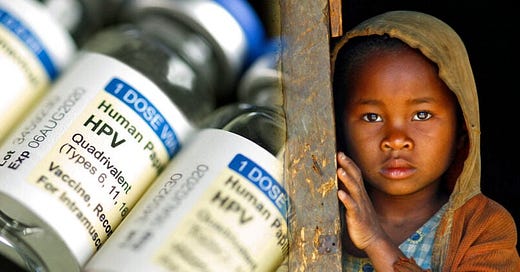Gates-Funded Plan to Vaccinate 86 Million Girls Against HPV Will ‘Unleash Mass Casualty Event,’ Critic Says
Gavi, the Vaccine Alliance is investing more than $600 million to reach its goal of vaccinating 86 million girls in low- and middle-income countries by 2025.
An international campaign — funded in large part by the Bill & Melinda Gates Foundation — to inject tens of millions of young girls with the human papillomavirus (HPV) vaccine is drawing fire from critics who allege the vaccine will cause far more harm than good.
Claiming the initiative will avert “over 1.4 million future deaths,” Gavi, the Vaccine Alliance announced it is investing more than $600 million to reach its goal of vaccinating 86 million girls in low- and middle-income countries by 2025.
The Gates Foundation co-founded Gavi and is one of its four permanent board members. UNICEF, the World Bank and the World Health Organization (WHO) — whose second-largest donor is Gates — hold the other permanent seats.
The Clinton Health Access Initiative also sits on the board.
James Lyons-Weiler, Ph.D., a critic of the global HPV vaccine campaign, suggested mass vaccination will cause a devastating number of serious side effects among young girls, even though there are still no studies showing the HPV vaccine prevents cancer, despite claims to the contrary by vaccine makers and public health officials.
Lyons-Weiler, head of the Institute for Pure and Applied Knowledge, told The Defender:
“In 2009, we were told the Severe Adverse Event [SAE] rate of HPV vaccines was 6.5%. But a study we published in Science, Public Health Policy & The Law showed that the adverse events profile of the HPV vaccine is far worse than has been reported.
“Unleashing this vaccine on millions of girls and young women will lead to a mass casualty event these countries do not now have, and do not need. SAE’s will occur at the rate of 65,000 per million women vaccinated, and the claimed net benefits of the vaccine are just not there.”
‘No eligible girl … left behind’
Nigeria earlier this month became the latest country in Africa to promote HPV vaccines by introducing the vaccine into its routine immunization program and announcing an initial drive to vaccinate 7.7 million girls — the largest number yet in a single round of HPV vaccination in Africa.
Gavi said Nigeria’s initiative would kick off with a five-day mass vaccination drive in schools and communities in 16 of Nigeria’s 36 states and the Federal Capital Territory. Phase 2 of the campaign will launch in the rest of the country in May 2024.
Gavi, UNICEF, the WHO and other “unnamed partners” are providing financial support so Nigeria’s Federal Ministry of Health can offer the vaccines at no charge across the country.
Gavi is co-financing vaccine purchases and providing technical support. The WHO paid to train workers and set up vaccination sites. UNICEF is providing 15 million vaccines, infrastructure for cold storage and logistical support. It is also running radio and TV ads “in multiple local languages to dispel misinformation and rumours,” the press release said
The partners trained over 35,000 health workers to deliver the vaccines at 4,163 sites across the 16 states participating in phase one of the rollout “to ensure no eligible girl is left behind.” Mobile vaccination units will be sent to remote communities.
“Gavi-supported vaccine introductions” for the HPV vaccine have been hindered by global supply shortages, the press release said, but those supply issues are being overcome “thanks to years of market-shaping efforts to develop a more robust vaccine market.”
HPV Gardasil vaccine-producer Merck, which has invested heavily in shaping the market since the U.S. Food and Drug Administration (FDA) approved the drug in 2006, last week announced that its 2023 third-quarter Gardasil sales grew 13% to $2.6 billion.
Merck is one of Gavi’s key partners in distributing vaccines in low- and middle-income countries worldwide.
The vaccine rollout in Nigeria comes on the heels of a similar Gavi-led — and UNICEF-, WHO- and Clinton Health Access Initiative-supported — national HPV campaign launched in Indonesia in August to add HPV vaccine to that country’s routine schedule. The initiative aims to vaccinate 90% of girls there.
Bangladesh also launched a similar national HPV vaccine rollout in October, aiming for 100% coverage. Zambia launched the same initiative in September, vaccinating 1.42 million girls ages 9-14 in six days.
Sierra Leone introduced the vaccine into its routine vaccination program in October and Eritrea launched a nationwide vaccine program in November 2022.
These programs are part of a 2020 program initiated by the WHO’s World Health Assembly to eradicate cervical cancer as a public health problem worldwide.
Gavi, Gates and the African HPV vaccine rollout
Gavi, the WHO and UNICEF are interconnected in a number of ways. Gavi is a public-private partnership launched in 1999 at a World Economic Forum meeting. By its own count, it has vaccinated 1 billion children since then, by employing “innovative finance and the latest technology.”
Gavi has long been criticized for placing too much emphasis on novel vaccines developed by its pharmaceutical partners rather than ensuring that basic vaccination is carried out, for being largely “top-down” and for subsidizing Big Pharma through questionable contracts and incentives — all in the name of “saving children’s lives,” according to scholar Anne-Emanuelle Birn, Sc.D.
The Gates Foundation maintains a heavy hand in directing Gavi. Although as a “public-private partnership” its private donor list includes upwards of 50 individual corporations, most of them have donated only between $200,000 and a few million dollars to Gavi. The Gates Foundation has donated $4.1 billion to date.
in Rwanda.
Although Gavi’s logo, not the Gates Foundation’s, appears on the HPV promotional literature and press releases, researchers have argued that Gates’ substantial funding for Gavi and the WHO, and the foundation’s research grantmaking give it outsized power to drive global and local health priorities and spending.
The Gates Foundation in September awarded a nearly $2 million, five-month grant to the Sydani Group in Nigeria, which is providing technical assistance for Phase 1 of Nigeria’s vaccine rollout.
The foundation also funded the HPV trials in low- and middle-income countries such as India and Kenya that justify mass vaccination and that are used to make dose recommendations, some of which have ended in scandal.
The campaign to eradicate cervical cancer is reminiscent of the Gates Foundation’s previous campaign, also initiated by the WHO and supported by Gavi, UNICEF and others, to eradicate polio.
Go paid at the $5 a month level, and we will send you both the PDF and e-Pub versions of "Government" - The Biggest Scam in History... Exposed! and a coupon code for 10% off anything in the Government-Scam.com/Store.
Go paid at the $50 a year level, and we will send you a free paperback edition of Etienne's book "Government" - The Biggest Scam in History... Exposed! AND a 64GB Liberator flash drive if you live in the US. If you are international, we will give you a $10 credit towards shipping if you agree to pay the remainder.
Support us at the $250 Founding Member Level and get a signed high-resolution hardcover of "Government" + Liberator flash drive + Larken Rose's The Most Dangerous Superstition + Art of Liberty Foundation Stickers delivered anywhere in the world. Our only option for signed copies besides catching Etienne @ an event.







